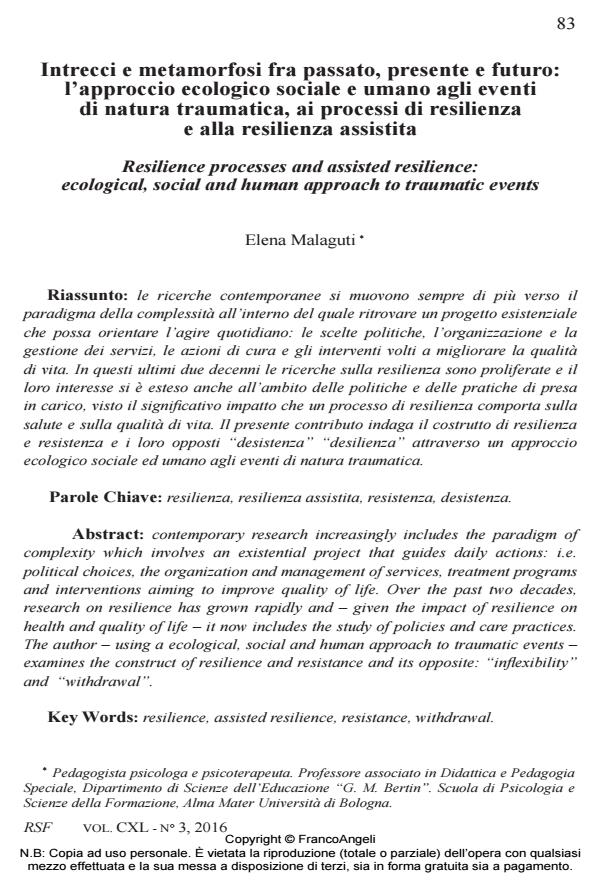Resilience processes and assisted resilience: ecological, social and human approach to traumatic events
Journal title RIVISTA SPERIMENTALE DI FRENIATRIA
Author/s Elena Malaguti
Publishing Year 2016 Issue 2016/3 Language Italian
Pages 15 P. 83-97 File size 690 KB
DOI 10.3280/RSF2016-003007
DOI is like a bar code for intellectual property: to have more infomation
click here
Below, you can see the article first page
If you want to buy this article in PDF format, you can do it, following the instructions to buy download credits

FrancoAngeli is member of Publishers International Linking Association, Inc (PILA), a not-for-profit association which run the CrossRef service enabling links to and from online scholarly content.
Contemporary research increasingly includes the paradigm of complexity which involves an existential project that guides daily actions: i.e. political choices, the organization and management of services, treatment programs and interventions aiming to improve quality of life. Over the past two decades, research on resilience has grown rapidly and - given the impact of resilience on health and quality of life - it now includes the study of policies and care practices. The author - using a ecological, social and human approach to traumatic events - examines the construct of resilience and resistance and its opposite: "inflexibility" and "withdrawal".
Keywords: Resilience, assisted resilience, resistance, withdrawal
- [1] Janet P.(1914). La Psychanalyse de Freud. Paris: L’Harmattan; 2004.
- [2] Spitz R. La Premiére Année de la vie de l’enfant, préface d’Anna Freud. Paris: PUF;1958, p.122.
- [3] Werner E, Smith R. Vulnerable but invincibile: a longitudinal study of resilient children and youth, NY: Mac Graw Hill; 1982.
- [4] Malaguti E. Educarsi alla resilienza. Come affrontare crisi e difficoltà e migliorarsi. Gardolo di Trento: Ed.Centro Studi Erickson; 2005. .
- [5] Ionescu S. Traité de résilience assistée. Paris: Presses Universitaries de France; 2011.
- [6] Ungar M. Resilience across Cultures. British Journal of Social Work 2006; 38(2): 218-235.
- [7] Cyrulnik B. Un merveilleux malheur. Parigi: Odile Jacob; 1999. .
- [8] Gu Q, Day C. Teachers resilience: a necessary condition for effectiveness. Teaching and Teacher Education 2007; 23: 1302-1316.
- [9] Richardson GE, Neiger BL, Jensen, Kumpfer. The Resiliency Model. Health Education Journal 1990; V: 21.
- [10] Cyrulnik B, Pourtois JP. École et resilience, Paris: Odile Jacob; 2007.
- [11] Gallese V. Neuroscienze e fenomenologia. Università degli studi di Parma. In corso di stampa in: Treccani Terzo Millennio; --www.unipr.it/arpa/mirror/pubs/[12] Gallese V. The Hand and the Architect: Gesture and Creative Expression. In: Unplugged. Projects of L22 and DGW Italy. Milano: L22; 2014, p. 14-17.
- [13] Gallese V. Corpo non mente. Le neuroscienze cognitive e la genesi di soggettività ed intersoggettività. Educazione Sentimentale 2013; 20: 8-24.
- [14] Hurtes KP, Allen LR. Measuring resiliency in youth: The resiliency attitudes and skills profile Therapeutic Recreation Journal 2001; 35.4: 333-347.
- [15] Rutter M. The promotion of resilience in the face of adversity. In: Clarke-Stewart A, Dunn J, ed. Families Count: Effects on Child and Adolescent Development. New York & Cambridge: Cambridge University Press; 2007, p. 26-52.
- [16] Lighezzolo J, Tychey C. La résilience. Se(re)construire après le traumatisme. Paris: In Press ed.; 2004.
- [17] Castel R. Les métamorphoses de la question sociale. Paris: Armand Colin; 1995.
- [18] Andersen HC. Fiabe. Torino: Einaudi; 1977.
- [19] Kafka F. La metamorfosi. Torino: Einaudi; 2008.
- [20] Aziz F. Il mio colore. Bazzano-Bologna: Artebambini; 2014.
Elena Malaguti, Intrecci e metamorfosi fra passato, presente e futuro: l’approccio ecologico sociale e umano agli eventi di natura traumatica, ai processi di resilienza e alla resilienza assistita in "RIVISTA SPERIMENTALE DI FRENIATRIA" 3/2016, pp 83-97, DOI: 10.3280/RSF2016-003007